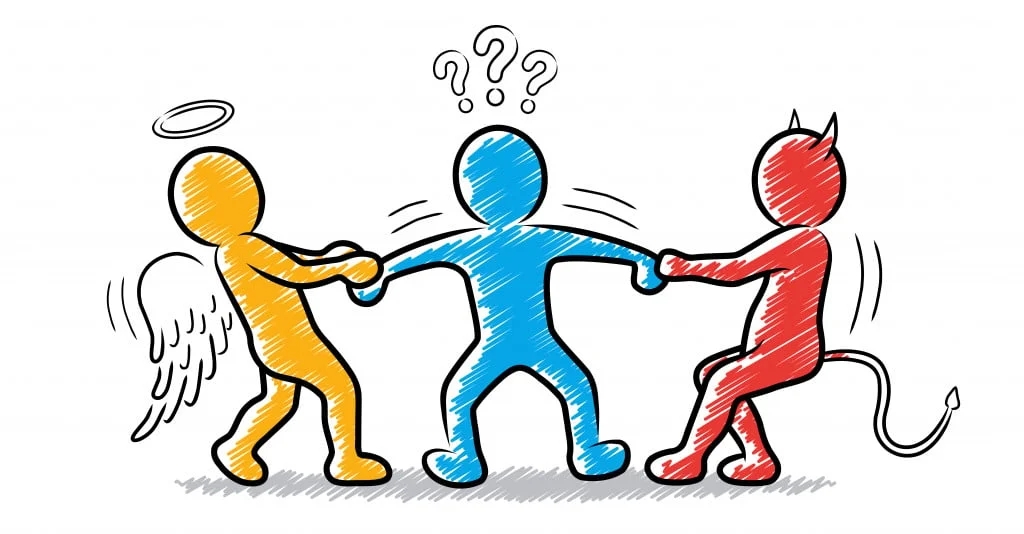I asked my students in Ethics this semester to write a short story on the theme “You may escape the law, you may escape the ethics committee, but you can’t escape your conscience.”

Their stories highlighted a number of points.
1. Sin is a terrible thing. From the young scientist who fabricated the results of a drug test that killed people, to the guy who patched organ parts in a demented attempt to recreate his daughter, sin is all the more ugly because it is chosen. On the other side, one must choose to repair it, then one might finally be set at peace. Otherwise, conscience will scream. Not a few wrote about the suicide of the protagonists.
2. We think we are kings and queens. But, in fact, there are limits. Look at any playground: if you don’t follow the rules no one will play with you. You can twist those rules, play your own game, but in the end you will have to apologize or the other kids won’t play.
3. Principles are better guides than rules. Legally, one can obtain a patent if the person one stole the idea from has no proof he was the originator. Laws define actions and circumstances, but cannot possibly define all the combinations. But the spirit of the law is based on principles of fairness. Conscience judges on principle, and punishes the actor with remorse. An actor might prefer to have his PhD rescinded than to bear the screams of his conscience.
4. Sometimes one will meet a situation that will challenge one’s sense of right and wrong. Maybe one is faced with imminent death and must administer an untested compound at risk. Often, lesser risks are more dangerous because they are easier to run. But then, being based on unethical principles, progressively worse decisions can be made down the line as they were not nipped at the bud. Guarding the conscience is a life’s work.
5. It is wise not to drown the screams of conscience. People on the right side of it recognize the signs of emotion and reason, then muster the courage to bite the pill. Nonetheless, the struggle is real:
• Strong emotions like rage, and strong feelings like agony can trump reason, and the deed may be hard to repair. But some people are able to choose the most uncomfortable outcomes, like the loss of a PhD, in exchange for the knowledge of having done the right thing.
• Often, as with job promotions, the desperate need to be right and to advance blinds one to seeing the immediate consequences of, say, fabricating a photo that someone might not even notice. Of course, we know someone eventually does.
• And then there’s simple cowardice in the face of peer pressure — “what will my boss say if I have no results to show while everyone else does?”
What can one do to stay ethical?
Always, heed the call of conscience, which is harder to ignore the more terrible the sin was. But that voice can be drowned out if our infractions are minor, and that leads to a vicious spiral. But we will hear it. When we do, let’s listen. Conscience can be wrong, its reasoning may be misplaced. But at least by lending it our ear we don’t take the first step in a deadly spiral.
Beware rationalization. This is easy for adults, because by habit we find a reason for doing any thing, even if we have to invent that reason. But you must ask: what do you base your ethical rules on? Do you base them on relativism, i.e., right is what I make it? The most insidious of these rationalization is, I think, relativism. Without a sense of an objective basis for right and wrong, there is no point to even discuss ethics.
Do you base them in law, i.e., if it’s not forbidden it’s allowed? Do you base them on a sense of duty? Do you base them on the nature of the act, or its consequences, on its lack of perfection? Do you base them, heaven forbid, on superstition?
Do you think that the ends justify the means? That pleasure is more important if immediate rather than delayed? Is it enough to look impressive rather than go through the effort of being impressive?
And then, what are your intentions? And how do the circumstances make the sin worse or less bad?
These considerations suggest that ethics should be a part of the curriculum and rigorously discussed and debated.
We will at some point ask the students to make sacrifices. I was moved when one student said “Sir, in this case I think I would rather sacrifice short term credit for long term trust.” I told her she just summarized the whole of ethics class.
The more effective sacrifices will not be in big things. They would be in the little challenges, which represent daily exercises rather than tournament competitions. Most of these small challenges will be anonymous, in areas where we would be ashamed if we were seen. Small challenges are often also in areas where we are afraid, and thus fail to do good when it is clearly in our power to do so.
Finally, it is good to confess our evil deeds. And on the flipside, to forgive. The consequences may be painful even if temporary. But still, the punishment will be a something in a sea of infinite somethings that took place in our past, present, and future.
We got this.
We do wrong. But, I think there’s no better peace than knowing we have been able to right our wrongs.
(Q.C. 230712)